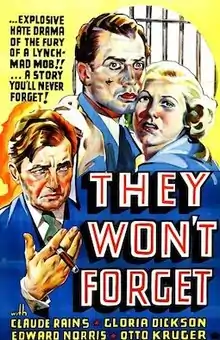They Won't Forget
They Won't Forget is a 1937 American drama film directed by Mervyn LeRoy and starring Claude Rains, Gloria Dickson, Edward Norris, and Lana Turner, in her feature debut. It was based on a novel by Ward Greene called Death in the Deep South, which was in turn a fictionalized account of a real-life case: the trial and subsequent lynching of Leo Frank after the murder of Mary Phagan in 1913.
| They Won't Forget | |
|---|---|
 | |
| Directed by | Mervyn LeRoy (credited as "A Mervyn LeRoy Production") |
| Produced by | Mervyn LeRoy Jack L. Warner |
| Written by | Robert Rossen Aben Kandel |
| Based on | Death in the Deep South 1936 novel by Ward Greene |
| Starring | Claude Rains Gloria Dickson Edward Norris Lana Turner |
| Music by | Adolph Deutsch |
| Cinematography | Arthur Edeson |
| Edited by | Thomas Richards |
Production company | Warner Bros. |
| Distributed by | Warner Bros. |
Release date | July 14, 1937 |
Running time | 95 min |
| Country | United States |
| Language | English |
Plot
A southern town is rocked by scandal when teenager Mary Clay is murdered on Confederate Memorial Day. A district attorney with political ambitions, Andrew Griffin, sees the crime as his way to the Senate if he can find the right scapegoat to be tried for the crime. He seeks out Robert Hale, Mary's teacher at the business school where she was killed. Even though all evidence against Hale is circumstantial, Hale happens to be from New York (Leo Frank was a Southerner from Texas, but he was Jewish and had been raised in New York), and Griffin works with reporter William Brock to create a media frenzy of prejudice and hatred against the teacher. The issue moves from innocence or guilt to the continuing bigotry and suspicion between South and North, especially given the significance of the day of the murder.
The film shows the immense pressures brought to bear on members of the community to help in the conviction – the black janitor who is induced to lie on the stand for fear he himself will be convicted if Hale is found innocent; the juror who is the sole holdout to a guilty verdict; and the barber who is afraid to testify to something he knows because it could exonerate Hale. Michael Gleason, Hale's lawyer, does his best, but Hale is convicted and sentenced to death.
The governor of the state, with the support of his wife, decides to commit political suicide by commuting Hale's death sentence to life imprisonment because the evidence is simply insufficient to send a man to his death. The townsfolk are enraged, and the murdered girl's brothers, who have been threatening all along to take matters into their own hands if Hale is not executed, plot and carry out Hale's abduction and lynching with the help of a vengeful mob.
Afterward, Hale's widow goes to Griffin's office to return a check he had sent her to help her out, telling him he cannot soothe his conscience that way. As he and Brock watch her leave the building, Brock wonders if Hale was guilty. Griffin replies without much concern, "I wonder."[1]
Cast
- Claude Rains as District Attorney Andrew J. Griffin
- Gloria Dickson as Sybil Hale
- Edward Norris as Professor Robert Perry Hale
- Otto Kruger as Michael Gleason
- Allyn Joslyn as William A. Brock
- Lana Turner as Mary Clay
- Linda Perry as Imogene Mayfield
- Elisha Cook, Jr. as Joe Turner
- Cy Kendall as Detective Laneart
- Clinton Rosemond as Tump Redwine
- E. Alyn Warren as Professor Carlisle P. Buxton
- Elisabeth Risdon as Mrs. Hale
- Clifford Soubier as Jim Timberlake
- Granville Bates as Pindar
- Ann Shoemaker as Mrs. Mountford
- Paul Everton as Governor Thomas Mountford
- Donald Briggs as Harmon Drake
- Sibyl Harris as Mrs. Clay
- Trevor Bardette as Shattuck Clay
- Elliott Sullivan as Luther Clay
- Wilmer Hines as Ransom Scott Clay
- Eddie Acuff as Fred
- Frank Faylen as Bill Price
- Leonard Mudie as Judge Moore
- Harry Davenport as Confederate Veteran
- Harry Beresford as Confederate Veteran
- Edward McWade as Confederate Veteran
- Ronald Reagan as Man in Crowd (uncredited)
Critical reception
Frank S. Nugent of The New York Times called the film "a brilliant sociological drama and a trenchant film editorial against intolerance and hatred."[1] Writing for Night and Day in 1937, Graham Greene gave the film a good review, comparing its effect to that of Fritz Lang's Fury. Greene found that "the direction of the picture is brilliant", and praised the writing for having "a better, less compromising story", however he confessed that he "doubt[ed] that They Won't Forget [would] have the same success [as Fury]".[2]
More recently, the film review website Allmovie.com gave the film five out of five stars.
In the documentary film I Am Not Your Negro, James Baldwin's unpublished notes recall the impression the face of the terrified black suspect left on him.[3]
Other versions
The story was also dramatized in 1987 as a four-hour television miniseries entitled The Murder of Mary Phagan, written by Larry McMurtry and starring Jack Lemmon, Kevin Spacey, Rebecca Miller, Cynthia Nixon and William H. Macy.
References
- Frank S. Nugent (July 15, 1937). "They Won't Forget (1937)". The New York Times.
- Greene, Graham (4 November 1937). "They Won't Forget/Nitchevo". Night and Day. (reprinted in: Taylor, John Russell, ed. (1980). The Pleasure Dome. Oxford University Press. p. 178. ISBN 0192812866.)
- MacDonald, Moira (2017-02-01). "I Am Not Your Negro review: A poetic journey into the heart of the civil-rights movement". Retrieved 20 December 2020.